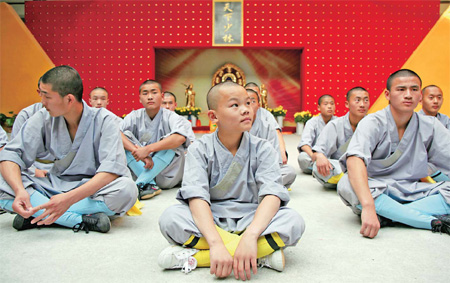Focus
From the height of success to the low of uncertainty
By Hu Yongqi and Zhang Leilong (China Daily)
Updated: 2010-11-25 07:56
 |
Large Medium Small |
Problem children
One of them was Zhao Peiyu. He grew up in the suburbs of Anyang, also in Henan, but was enrolled by his family at Tagou in 2003 because he "was too naughty".
His previous two years at a regular school were filled with on-campus fights and constant warnings from teachers about his behavior.
"I couldn't stand it (at Tagou) the first few months," he said. "Practicing in the heat of the afternoon sun left my arms and neck badly burned."
Most wushu apprentices in Dengfeng fall into three categories: countryside children left behind by migrant workers, children of single parents and children born out of wedlock. According to Chinese psychologists, these groups are all at risk of developing anti-social tendencies, such as over-aggressive attitudes or extreme shyness.
Based on estimates by staff members at all 10 schools visited by China Daily reporters in November, more than 70 percent of their students are from rural families.
"Most of my class was born in the countryside," said coach Zhang at Shaolin Temple School, which has 10,000 registered students and is funded by the world-famous Shaolin Temple.
"Compared with those from urban areas, rural children can bear the hardships of learning wushu and don't give up easily," she said.
One initial hardship is coming to terms with the militaristic management style at wushu institutes. Unlike regular schools, students are often banned from leaving campus on weekdays and even need permission from teachers before they are allowed to leave on weekends.
When China Daily reporters visited Songji Wushu School on Saturday Nov 13, some of its 110 students could even be seen painting railings outside a four-story dormitory building.
Yao Yuqing, director of its general office, defended the decision to get youngsters to decorate for free by arguing that they "had nothing else to do on weekends".
The school's website, which features many pictures of the Shaolin Temple but few of its modest classrooms and dirt-covered basketball court, states the annual tuition fee is 1,600 yuan ($240). However, students said they had been charged almost double that.
Yao refused to comment when asked about the price difference or whether the school is fully qualified to teach. Calls to the Dengfeng's wushu administration office also went unanswered.
Men at Shaolin Temple School said he believes the strict conditions, coupled with "peer pressure", can help troubled youths learn to "behave better and live independently".
"The schools are helpful to a stable society," he added.
In fact, wushu schools have become particularly helpful to the parents of illegitimate children. As these children are often unwelcome among Chinese families, many are unable to go home during national holidays, such as Spring Festival, and are forced to pay extra to stay in their dormitories.
Shaolin Temple School teaches 500 to 600 illegitimate children, according to Men. He would not reveal the charge for the "overtime care" but explained many parents are happy to pay so they can have a "comfortable holiday".
